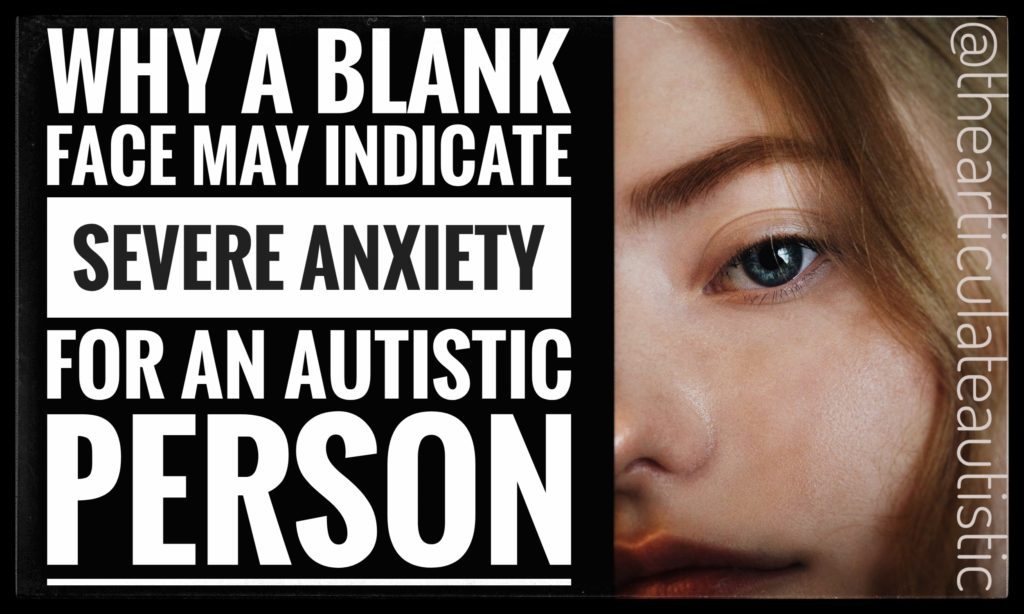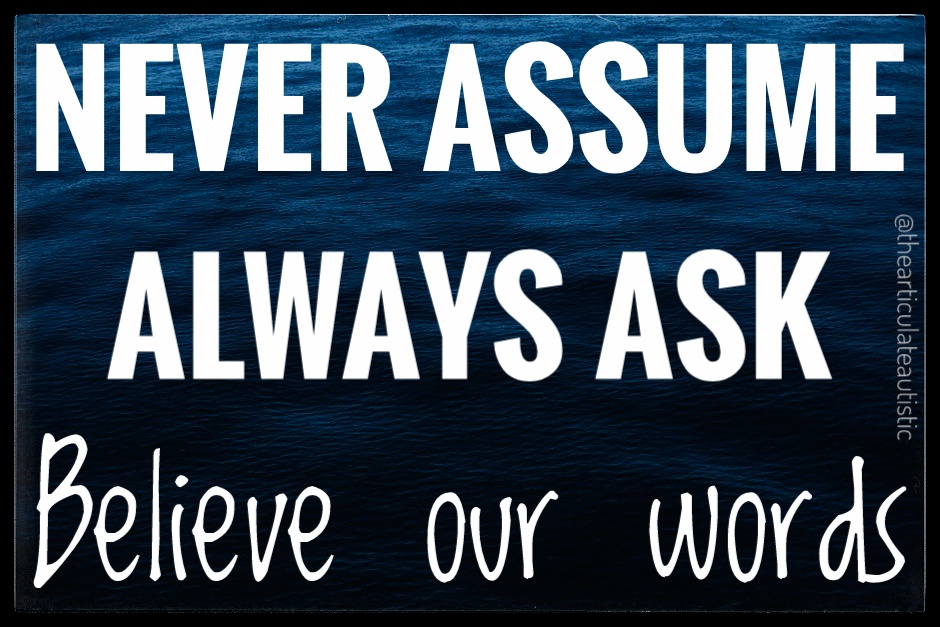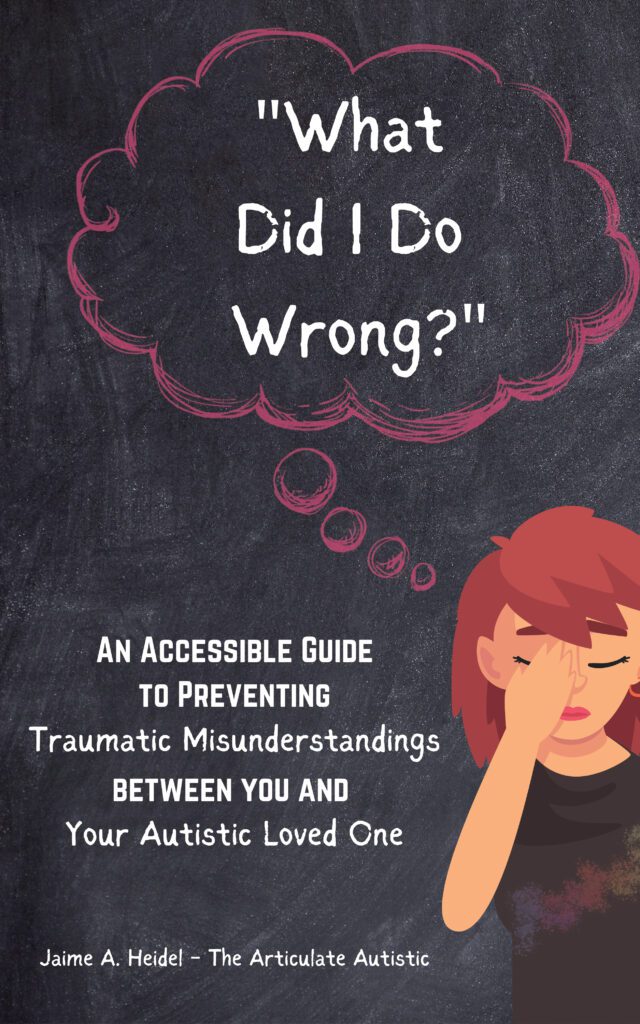Why I (An Autistic Person) Seem Almost Eerily Calm When I’m Most Anxious

Trigger Warning: Mentions of consent and sexual activity throughout.
For those of you who don’t know, I’ve been in treatment for breast cancer since March of this year. I’m post-chemo and post-surgery, but I’m now undergoing radiation treatment. Last week, the radiation nurse was explaining the procedure in detail, and I apparently wasn’t having the response she expected.
She said I was so “chill” about the whole thing. She kept trying to tell me about the procedure, but I just found the information irrelevant because I have such a poor working and short-term memory, I was never going to remember what she was saying anyway, AND, honestly, in most cases, the LESS I know about these things, the better.
Even when I went into surgery in July, I was so calm, I even surprised myself. I was just like, “Ehn. Whatever.” But I’d already been through so much at that point! Biopsies, scans, chemo, etc. Not to mention the initial horror of the diagnosis (where I cried during the entire consultation and absorbed pretty much none of the information my doctor was giving me).
In the case of yet another treatment (the radiation), I think it’s a “been there, done that” situation. At this point, I’m old hat. So, the calm resignation is just that. I’m used to it, I have no choice, but I know it will be over soon.
But, the conversation with that nurse did bring up a topic I wanted to address here.
I’ve been told I’m calm so often that’s it’s actually become comical because I’m one of the most anxious people I know. However, my anxiety often doesn’t show up on the outside the way it does for neurotypical people, which can cause a lot of misunderstandings, disbelief, and minimizing or dismissing of my emotions and experiences.
And, from what I understand, many autistic and otherwise neurodivergent people experience the same thing.
Furthermore, I also think this communication barrier can cause serious problems in the dating and sex realm, especially when it comes to the understanding of consent. (Freezing is NOT consent, by the way, more on that later.)
If your autistic loved one has been telling you they are anxious, afraid, or near a meltdown, but their facial expressions and body language are communicating anything but, here are some reasons why that may be happening:
Masking
So, one of the (many) ironic things about growing up as an undiagnosed autistic in a neurotypical world is how the masking I learned and use to survive can backfire on me when others try to gauge my internal feelings by my facial expressions, body language, and the like.
As a child, I was “taught” (by way of bullying, abuse, and neglect) that my natural and genuine emotional responses were NOT at all appropriate. Like many autistic people, I feel to the extreme, no matter what that feeling is.
If I’m sad, I’m sobbing, if I’m happy, I’m laughing and stimming and squeaking and bouncing, if I’m scared, I’m shaking and stammering and having trouble breathing, if I’m angry, I’m scarily enraged.
My point is, my outward emotional response used to accurately reflect my internal experience. There was no exaggeration, no drama, and no attention-seeking behavior. I was simply expressing myself in a genuine manner.
Furthermore, I had no idea that my responses were seen as disproportionate until the adults around me had shocked, angry, affronted, etc., type of emotional responses towards MY emotional reactions, which taught me nothing about my behavior (because I couldn’t connect my behavior to their response), but instead made me think that the neurotypicals around me were just mentally unstable people who exploded at random for no reason.
Enter masking. Once I started emulating neurotypical behavior and forcing my very strong, very loud, very intense emotions through a neurotypical filter, I was no longer an immediate and constant target for emotional abuse due to misunderstanding.
Over time, masking became my default. Meaning, that it didn’t matter WHAT I felt or what was happening to me (with some exceptions), I would only show about two percent of what I was experiencing inside because that was all that was acceptable to the people around me and wouldn’t result in my immediate punishment.
The problem with masking becoming my default (my brain just does it now) is I would talk about my debilitating anxiety with calm, relaxed body language, an impassive face, and sometimes even a smile, and, of course, NOBODY took me seriously until my traumatized and burnt out self ended up in the psych ward in 2014.
Disassociating
In addition to being autistic, I also have PTSD, so disassociating is a thing I do often. I break my disassociating into two types:
- Sensory Breaks
Existing as an autistic person in a neurotypical world is exhausting, full stop, no matter what situation I’m in. To combat this constant overwhelm, I have moments where my face goes completely devoid of expression, my jaw slackens, and I just kind of look…blank.
I tend to do this during tedious tasks such as washing the dishes or showering (or even writing this sentence, my face just feels flat right now).
Unlike neurotypical people whose emotions appear on their face automatically, I actually have to think about arranging my face the way I want it to look in each differing social situation, and sometimes, that’s a couple of facial expression changes per minute, and that takes a great deal of tiring effort.
As helpful and necessary as sensory breaks are for me, I could be quite anxious during one, but nobody would know because my face reads completely impassive.
- Trauma/Sensory Overload Disassociation
Actual disassociating occurs when I either have sensory overload, I’m extremely tired and pushing myself too hard, or my PTSD has been triggered. Then, it’s not just my face that goes slack, I start to “go away” in my mind, and it kind of feels like my head is a balloon slowly floating away from my body.
Again, I could be very anxious during these moments, but you wouldn’t be able to tell looking at me unless you were a trained professional because my face just looks neutral.
And this is where I’ll mention consent. If you’re trying to engage in sexual activity with another person, and they have a blank facial expression, and they are not saying yes, but they are not saying no, that is NOT consent. They are checking out for one reason or another. Do not proceed with any type of sexual contact unless you get a verbal and enthusiastic “Yes”.
Freezing
I think disassociating and freezing are often used interchangeably, but I wanted to address it separately because I think freezing is more intense than that. When you freeze, it’s not just your mind that goes fuzzy and checks out, so to speak, it’s a whole-body response.
Freezing, which is a trauma response that belongs in the fight, flight, and fawn category, usually occurs in response to a trigger and can cause the person to not only mentally check out, but for their body to go rigid and their breathing to become shallow. Even their skin may feel colder.
For all intents and purposes, they are gone.
Again, talking about consent, don’t think that just because the person you’re trying to engage in sexual activity with is saying “yes” because they aren’t saying no.
A freeze response could mean the person is experiencing utter terror inside, but because they are essentially unable to speak or move too much, it may appear to the untrained eye that they are incredibly calm (even high).
I have a freeze response when I’m yelled at. My whole body goes rigid, and I just check out. I breathe very shallowly, and nothing the person says registers at all. After the freeze response passes, I have either a fuzzy memory or no memory of what was said to me.
And that traumatic freeze response is the direct result of neurotypical people misreading my emotions, motivations, and intent throughout my life, and then suddenly screaming at me, shaking me, or otherwise abusing me.
(Please don’t do that to your autistic loved ones. Preventing this trauma from happening to other autistic people is the reason I write these blog posts.)
Another reason why I, as an autistic person, may seem calm when I’m very anxious or even in a very intense situation is delayed emotional processing.
Depending on the crisis, as long as nobody is yelling directly at me because they are angry with me, I’m pretty cool and collected and can get whatever job needs doing done before collapsing later on as the emotional response to what happened hours or days ago finally kicks in.
If your autistic loved one seems eerily calm and collected in a crisis or intense situation, avoid interpreting that as an uncaring response. This has nothing to do with the level of caring the autistic person feels toward you or the situation itself. This is just the brain’s way of temporarily delaying the emotional response so the crisis can be effectively managed.
This really comes in handy in a crisis, but it can be very confusing for others when we finally break down after all the neurotypical people in our lives have just started moving on.
Emotional compartmentalization
I don’t know if a large majority of autistic people can do this, or if I’m just in the minority even among my fellow neurodivergents, but emotional compartmentalization is another reason I may appear impassive when I’m actually feeling a very strong emotion. I think this goes hand in hand with delayed emotional processing and may, in fact, be the precursor to it.
For example, say a small kitchen fire breaks out, I deal with it, making sure everything and everyone is safe and secure, while the emotional part of my brain, which is temporarily behind a gate, jumps up and down with fear.
Once the crisis has passed, that’s when the emotional part of my brain gets released from behind the gate, and all my feelings come rushing in at once in a jumbled and sometimes confusing tangle.
Resignation
I can actually be terrified in to being calm. Again, to circle back to my cancer diagnosis, I really couldn’t handle the enormity of what was going to happen to me once I got that phone call. So, and part of this may be disassociation, I went into what I refer to as resignation.
My thought about my diagnosis was, there is literally nothing I can do to stop this, and I’m not in control, and, in some strange fashion, that gave me a type of comfort.
It was inevitable. I could either go in kicking and screaming, or I could stand tall and deal with it. Either way, it was going to happen.

The best way I can describe what was happening to me internally at that time is a scene from Twilight: Breaking Dawn – Part 1 where Bella is turning from human to vampire. If you know the movie, you may remember how Bella’s body and face were completely still and emotionless, but on the inside, every cell in her body was screaming in agony. That’s how I felt in the first few weeks of my breast cancer journey.
Another type of resignation for me is when I just run out of adrenaline. My fear or trauma response is so bad and so prolonged that my body can’t produce any more adrenaline, and I just stop being scared because my body has stopped sending fear signals to my brain.
If you really stop and think about it, that’s scary. Being scared into being calm this way can, again, make an outsider think the other person is cool as a cucumber about whatever situation they’re in when, in fact, they’re in serious psychological danger.
The Takeaway
Eerie calmness on the part of your neurodivergent loved one does NOT mean that everything is OK on the inside and that everything should proceed as usual. If your autistic or otherwise neurodivergent loved one communicates to you that they are afraid or having an anxiety attack or near a meltdown, but their face and body language seem to indicate otherwise, listen to (or read) their words and signs. Trust them, and get them out of the situation as quickly and safely as possible.
The worst thing you can do is mock or disbelieve a neurodivergent person who tells you they’re terrified but their body language or facial expressions don’t match what you understand as signs of fear or anxiety. This only puts us in further danger.
Sometimes, when we appear to be the calmest you’ve ever seen us is when we actually may need your help the most.
Never assume. Always ask. Believe our words.

Learn more about how your autistic loved one thinks, feels, and experiences the world by picking up your copy of my book, “What Did I Do Wrong?”




It could also be because of a shutdown. If I don’t feel completely safe (as if the person/people I’m with have the resources and the willingness to comfort me), I shut down instead of melt down. It feels just like a meltdown internally, but externally, I lose the ability to communicate. That means no body language or verbal language. My face does not move. I can turn my whole body in the direction of someone addressing me, but I can’t turn just my head and I can’t look at them. I cannot speak. Strangely, I can write perfectly well. My hands are able to communicate, though the rest of me isn’t. I’ve been looking into learning sign language.
This isn’t usually mistaken for calmness, because I’m normally very chatty and a person going from very chatty and smiley to blank and silent is an obvious sign of something being very wrong. But if anyone else also has shutdowns, that might be relevant in the context of this article.